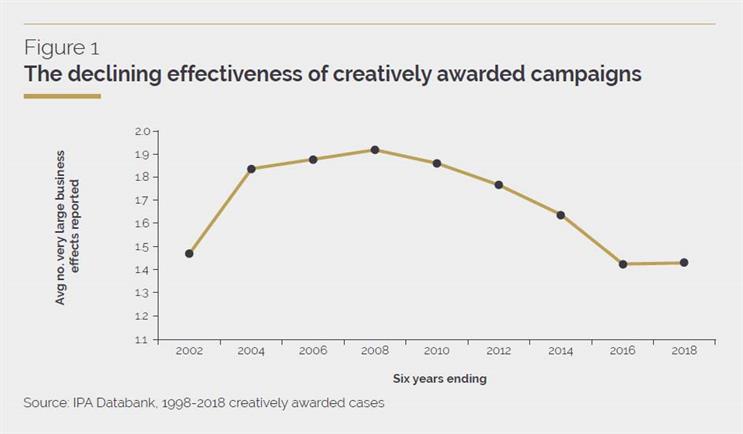
Award-winning creative campaigns are having little or no effective impact and are now no more effective than non-awarded work, with efficiency continuing to decline among these campaigns.
This is according to the IPA's The Crisis in Creative Effectiveness report, unveiled at the Cannes Lions Festival of Creativity.
The study measured efficiency in terms of the difference between a brand's share of voice and market share.
It drew on data from 600 case studies from 1996 to 2018 and is a follow-up to the advertising body's 2016 publication Selling Creativity Short, which underlined threats to creative effectiveness from short-termism in marketing.
Findings show that the correlation between creativity and effectiveness, and between creativity and efficiency, is weakening due to a shift to "short-termism" and activation-focused creativity that delivers very little of its full potential.
Noting a trend for creative judges to increasingly award campaigns that pursue short-term goals, the report says this is encouraging a short-term mindset, despite that fact that, in the short term, creativity does not sell.
The report identifies how the trend of declining effectiveness of creatively awarded campaigns can be reversed by learning from creative best practice.
It says: "High-performing, creatively awarded campaigns are eight times more effective than their low-performing peers, in terms of the number of business effects they generate, and almost 16 times more likely to bring major profitability growth."
±±ľ©Čüłµpk10s that the IPA identified as embodying long-term creativity include "Made of more" for Guinness and "You're not you when you're hungry" for Snickers, by Abbott Mead Vickers BBDO and BBDO respectively. It also singled out John Lewis & Partners – whose advertising is created by Adam & Eve/DDB – for balancing its "annual pre-Christmas TV-led brand-building campaign with year-round sales activation".
Peter Field, effectiveness expert and author of the latest study, said: "Despite our warnings, the misuse of creativity has continued to grow and the effectiveness advantage has continued to decline.
"This report is a final wake-up call for good sense, before it is too late. We cannot afford to go on being complacent; left unchecked, the catastrophic decline in creative effectiveness will ultimately weaken support for creativity amongst general management. Money spent on creativity will become ‘non-working’ budget and will be cut."



.jpg)
.jpeg)
